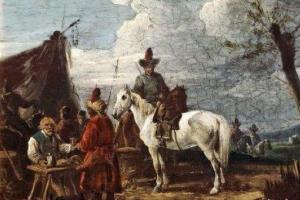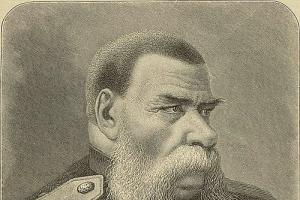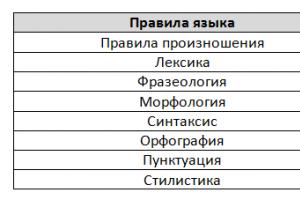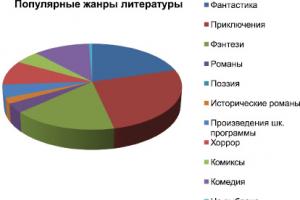| Speech samples for commenting on the author's position | ||
| OK | Neutral position (statement of facts) | Blame, condemnation |
| The author admires...; amazed..., surprised...; as if inviting him to admire with him...; watches with interest...; admiring (something), creates a verbal picture; like a good friend and wise adviser, the author talks to us about | The author reflects on...; as if he invites the reader to dialogue...; shares his thoughts, observations...; poses an important, topical problem to readers...; tries to explain complex philosophical concepts (complex life concepts), etc. | The author writes with pain in his heart that...; speaks bitterly about... the author is indignant...; the author cannot put up with that...; writes with bitter irony about...; The author ends his emotional, excited reasoning with an equally alarming conclusion... |
b) S. Soloveichik shares with readers his thoughts that faith is “the most important function of the soul.” The author unobtrusively, without excessive edification, proves that without this “transmission mechanism” between the mind and heart, the soul of a person will “dry up.”
Class: 5v
Topic: V. Soloukhin's story "The Avenger". "Revenge or forgiveness"?
Lesson type: lesson of “discovery” of new knowledge.
Lesson objectives:
J. Educational: using the material of the story to achieve a conscious perception of the text, understanding and solving the problems presented in it; improve the skills and abilities of analyzing a work of art.
JI. Developmental: continue to develop the ability to analyze, compare, prove, formulate a generalizing conclusion, work on the development of students’ speech activity.
JII. Educational: to cultivate a sense of responsibility, a humane attitude towards people, to promote the formation of beliefs and needs of students in assessing the consequences of revenge and consciously rejecting it.
Personal UUD: developing a respectful attitude towards other opinions; development of thinking, attention; development of independence and personal responsibility for the results of one’s activities, goodwill.
Meta-subject results:
- regulatory learning activities: independently formulate the topic and goals of the lesson; have the ability to set goals.
- cognitive UUD: to develop the ability to realize the importance of reading for further learning, to understand the purpose of reading; present the content of the text read concisely, selectively.
- communicative UUD: develop the ability to argue your proposal, persuade and yield; develop the ability to negotiate and find a common solution; master monologue and dialogic forms of speech; listen and hear others.
Methods: problem-based search (leading to dialogue), method of independent work with text, visual method (presentation).
Techniques: dialogue, commented reading, expressive reading, cluster building, frontal survey, syncwine.
DURING THE CLASSES
I. Self-determination for activity (organizational moment). SLIDE №1
Good afternoon Guys, we have guests today. Give them your smiles, see how they smile back at you. I wish today's lesson brings you only joy. Let's start the lesson.
II. Checking homework (tasks: checking homework, updating and “going out” to explain new material) SLIDE No. 2
Tell me, what did we talk about in the last lesson?
What basic biographical facts do you remember?
Vladimir Soloukhin says that it is in childhood that a person’s character is formed. He carries many character traits acquired in childhood throughout his long life. That is why from the very beginning, from an early age, one must strive to be kind, honest and courageous - the writer calls these qualities the main ones.
III. Updating knowledge and recording difficulties in activities.
Guys, how do you understand the meaning of the word “avenger”?
In order to find out what word it is derived from, you need to solve the rebus.
1. Rebus SLIDE No. 3
Cross out all the letters of the English alphabet and read the puzzle.
r m l e g with d t s n i w ь z
What word did you come up with?
What does it mean? (action in retribution for harm caused, retribution for something. (From the dictionary)) SLIDE No. 4
2. Creating a cluster (on the board)
Guys, what do you associate the word “revenge” with?
Now confer with your desk neighbor and write down in the ovals that lie on your tables one word that you associate with revenge (children write it down).
I also wrote down a few words. Alina, please come to the table, choose the words that, in your opinion, are more suitable for the word we are interested in and pin it on the board.
Well done!
The desire for revenge is a very strong feeling that manifests itself regardless of what times people live in. It can be very difficult to resist him.
Now look carefully at your notes, the notes on the board and conclude what we feel when we say this word (children answer).
Conclusion: the word “revenge” evokes sad, disturbing associations.
On the board we have a cluster that will help us understand the feelings that our hero experienced towards his offender.
IV. Setting a learning task.
Guys, look at what synonyms you can find for the word revenge. SLIDE No. 5
Assignment: You will have to choose one of these definitions or give your own, write an essay on the topic: Revenge can be compared to .... (essay volume - 1-2 pages)
Draw how you imagine revenge and forgiveness, think about what colors you will choose for this.
Describe the main character of the story in the form of a syncwine.
Each of us has a little sun inside us. This sun is kindness. A kind person is one who loves people and helps them. And love and help warm you like the sun. And in memory of our lesson, I would like to give you some sunshine.
Prokofieva Margarita Borisovna
Job title: teacher of Russian language and literature
Educational institution: MBOU "Lyceum No. 2"
Locality: Mikhailovsk city, Stavropol region
Name of material: routing
Subject:"Revenge or non-revenge is a choice that everyone can face"
Publication date: 01.11.2016
Chapter: secondary education
Prokofieva M.B. teacher of Russian language and literature MKOU "Lyceum No. 2" of the city of Mikhailovsk, Shpakovsky municipal district
Technological lesson map
extracurricular reading on literature
“Revenge or renunciation of revenge is a choice that may
everyone turns out to be"
6th grade
“The World is Around You...: A Book for the Student. 6th grade. – M., 1999
Lesson topic
Revenge or renunciation?
Lesson type
Learning new material
The purpose of the lesson
Create conditions for the formation of ideas about revenge, its evolution in the history of mankind
Lesson Objectives
Educational
: using the material of the works to achieve a conscious perception of the text, understanding and solving the problems presented in it; improve the skills and abilities of analyzing a work of art.
Educational:
continue to develop the ability to analyze, compare, prove, formulate a generalizing conclusion, and work on the development of students’ speech activity.
Educational:
to cultivate a sense of responsibility, a humane attitude towards people, to promote the formation of beliefs and needs of students in assessing the consequences of revenge and consciously rejecting it.
Educational Resources
Presentation “Revenge or renunciation of revenge?”
Personally significant
problem
“In life there is only one undoubted happiness - to live for others” (L. N. Tolstoy)
Methods and forms
training
Methods: visual, heuristic conversation, partial search, Forms: individual, frontal, work in pairs
Technologies and techniques
Developing critical thinking through reading and writing. Six thinking hats technology. Techniques “Cluster”, “Prediction Tree”, reading with stops
Basic Concepts
Revenge, mercy, humanity, humanism
Planned results
Subject
Metasubject UUD
Personal UUD
They will learn to: build relationships and relationships with other people. LEARNING OPPORTUNITIES: work with literary text; express your own opinion, judgments
Regulatory:
adequately perceive the suggestions and assessments of teachers, comrades, parents and other people.
Cognitive:
choose the most effective ways to solve problems; control and evaluate the process and results of activities.
Communicative:
agree on the distribution of functions and roles in joint activities; develop the ability to argue your proposal, persuade and yield; master monologue and dialogic forms of speech; listen and hear others. Show the ability to solve moral dilemmas based on taking into account the positions of partners in communication; are guided by their motives and feelings, consistent adherence in behavior to moral standards and ethical requirements
ORGANIZATIONAL STRUCTURE OF THE LESSON No. Stages of the lesson Forms, methods, techniques Activities of the teacher Activities of students Formation of UUD
1.
Organizational
moment
Welcomes students and guests Welcomes teachers and guests
2.
Call stage
Updating knowledge Arousing interest in obtaining new information Social survey Visual series (drawings) Associative I want to talk to you about a feeling that everyone probably experienced. ■ Who likes jokes? ■ Who has ever made fun of their friend? ■ Who doesn't like being made fun of? ■ Who knows the continuation of the phrase: “Make peace, put up and more...”? ■ Who has ever asked for forgiveness when they offended someone? ■ Who has been wrong in an argument at least once? ■ Who agrees that “they carry water on the offended”? ■ Who responds to angry words with a joke? ■ Who forgave when he was offended? ■ Who hasn’t forgiven? ■ Why do fights happen? ■ If someone is offended, what feeling arises? (revenge) This is exactly what I would like to talk to you about.
What is revenge?
Reading
text
"Tales
temporary
years" about Olga's revenge on the Drevlyans, you
illustrated
actions
Olga.
What do you associate it with?
Answer the teacher’s questions Write down the word REVENGE and its associations
Personal:
self-determination, formation of interest in this topic.
Communicative:
planning educational collaboration with the teacher and peers; the ability to enter into dialogue and participate in a collective discussion of an issue.
Cognitive:
subsuming knowledge under a concept.
row Cluster
What does revenge look like?
What works are you already in?
Have you come across this concept?
What else would you like to know about this concept? Write down works Formulate lesson goals
3.
Stage
comprehension
Reading and comprehension of a literary text maintaining interest in the topic while directly working with the text helping students actively perceive the material Conversation Technology “Six Thinking Hats” Revenge is the deliberate infliction of evil in order to repay an insult or insult. Let's turn to The Tale of Bygone Years and see how Olga's revenge on the Drevlyans for the death of Igor is assessed.
Why did Olga take revenge?
What rule did the prince break?
Igor?
How did this make you feel?
Drevlyans, did they have another
exit?
Did Olga do the right thing?
Figure out
this
question
Six thinking hats will help.
"White Hat"
- you will accurately and specifically list the events associated with Olga’s revenge.
"Yellow Hat"
- praise Olga, name her positive sides, character traits. In 945 The Kiev prince Igor, together with his retinue, went to the Drevlyan tribe for tribute. The collection of tribute in those days was called polyudye. Having collected it safely, the prince went home. but soon returned and again demanded payment of tribute. The Drevlyans united and gave a fierce rebuff. Igor himself was captured and given a painful, shameful death.
her revenge is special:
a) funeral in a boat; b) burning in a bathhouse; c) a funeral feast with the murder of 5 thousand Drevlyans; d) war with the Drevlyans; e) burning of the capital, city
Regulatory:
developing skills to work in a group
Communicative:
taking into account different opinions; argumentation of one’s opinion and position in communication; expressing your thoughts with sufficient completeness and accuracy.
Cognitive:
structuring knowledge; conscious and voluntary construction of a speech utterance; understanding texts, extracting the necessary information.
Personal:
moral and ethical assessment of content.
"Black
hat "
- note the negative traits of the heroine. State what you disagree with.
"Red
hat"
- you guys need to characterize the hero, indicating what feelings and emotions he experiences. Tell us about your feelings.
"Green
hat"
- the fate of the hero is in your hands, tell your story, perhaps, a happy ending to the work. Could Olga have acted differently?
" S i n i
hat "
-
you must sum up the work of all hats and draw conclusions.
Ten
centuries
separate
events,
which
"Tales
temporary
years". However, even today, in the 21st century,
questions,
related
t akim
a phenomenon like revenge is still
people care.
- How does a person act: will he submit to the desire for revenge and enter into a “vicious circle” or will he be able to overcome this destructive feeling. Your idea of how a person might behave in such a situation,
offers
stories
"Mother
human"
Korostenya CONCLUSION: However, we should not forget that at that time Olga was still a zealous pagan and with her actions, first of all, Olga fulfilled her sacred religious duty. The historian Solovyov says, justifying Olga, that “the custom of revenge was a protective custom that replaced justice, and the one who sacredly fulfills the duties of revenge is a necessary hero of truth” and that “the duty of revenge for the human race was then a religious duty, the duty of expressing piety.”
Reading with stops
V i t a l i y
Aleksandrovich
Zakrutkin.
I could not, I had no right to forget this woman. Her difficult life, her pure soul, her deep and kind character, and finally, how in complete solitude she survived those terrible months that became a great test for her - all this was known to me... Thus begins the story, which in full we will read in high school, and today we will just open some pages. The writer creates an exceptional situation: during the Great Patriotic War, punitive forces burn the farm to the ground, and some of the residents are killed, others are driven into captivity. And now only Mary remains on the ashes, whose husband and son were hanged. And yet the heroine finds the strength to live. However, a new test awaited Maria, who returned to the burned village.
What test?
Which
feelings
and tried
describes
German?
Retelling the beginning
Reading the text Technique “Tree of Predictions”
Does he make you feel sorry?
What about Maria?
Which
wish
took possession
Maria? Why did she decide to
murder?
What will Maria do? ("Tree
predictions")
Did the German expect death?
What do you think made
Maria
refuse
to sweep?
did she experience after that?
How did Maria's attitude towards
German?
What conclusion can be drawn?
Has Maria overcome her feelings of revenge?
Read from the text Read from the text Yes No Read from the text Will kill, spare, regret Yes read
4.
Reflection stage
help students independently summarize the material; help you decide on your own in further processing of the material Let's return to the cluster and summarize. What would you add or take away from it? What did these works make you think about? What did you teach? What do you understand? Revenge... How much sometimes lies behind these five letters! Revenge intoxicates, deprives you of reason, pushes you to rash actions, forcing you to suffer and repent later. No wonder they add REFUSION OF REVENGE
Communicative:
formulating and justifying your opinion.
Regulatory:
assessment of one's own activities in the classroom
They say that ahead of revenge come hatred and anger, spilling their poison, and behind is repentance, not daring to raise eyes filled with tears. What will you do: will you submit to the thirst for vengeance and go on the warpath, or will you be able to overcome this destructive desire? It's your choice... And so that you don't make mistakes in life,
I
I want to give you “Rule
boomerang"
Don’t make others angry and don’t be angry yourself. We are guests in this mortal world. And if something goes wrong, accept it. Be smart, smile. Think with your head calmly, After all, everything in the world is natural. The evil emitted by you will certainly return to you.
5.
Homework
Finish the cluster and write a short reflective essay
“Revenge or non-revenge is a choice,
which you may face
Hello Tatiana
I have carefully read your letter and invite you to build our dialogue through responses to key phrases from the letter:
I have a strong grudge against a friend who forgot and left me.
You write yourself that your friend doesn't consider you his girlfriend or even his friend, but only an acquaintance. Then tell me how he can forget you and leave you? You decided for yourself both for myself and for him, that there is something more between you and you yourself believed in it. But.... it's only yours Image the fact that he is your boyfriend, in fact, this is not the case and the guy openly tells you about it. Maybe you will see now that you no one threw or left?
I've been loving him very much for several months now. But he - no, he doesn’t even consider me a friend, only an acquaintance
You rather like him very much, With love I wouldn’t call it this, because it begins from the person himself to himself, and your suffering speaks precisely of the fact that you are still haven't learned to love yourself, which means they are also not ready to love another.
I can’t let him go, but I’m constantly taking revenge, and soon I might end up killing him.
You just can't to keep him near you without his own desire. But you can’t let go, not him, but only yours. Expectations, which do not coincide with reality at all. The extreme of your desires is from being next to him, and to the most terrible - thoughts of killing him, already suggests that you have invented a lot for yourself and it is now very painful for you to accept the truth as it is. Have you thought about the consequences of your desire to kill another? Anyway, you you won't be with him, you will lose the most important thing -Freedom, since any crime is punishable. You shouldn't joke with emotions, sometimes they cost too much at a high price.
I’m already on antidepressants, I’m completely immersed in work, I’m very lonely, there’s no support.
This phrase of yours is the most important, because it shows very well your Loneliness, in which you have been for many years. Perhaps it has something to do with your childhood, with your relationship with your parents - with mom. You lacked attention, tenderness and Love from people close to you and you wanted this gap in your Soul filled with the search for a new relationship, and for some reason they decided that this guy is the one who gives you this Love will give. Perhaps he showed some attention to you - spoke to you, or answered your questions, or simply listened to you, and you have already decided that this is enough to love him and demand Love from him too.
Any requirement in love and in relationships it always speaks of a certain person’s Dependence on others and the desire to control them. Yours Loneliness just because you couldn't understand main -You themselves are the person whom you can love the way you would like others to love you. You can’t force others, but you can learn it yourself, you just need to know how. This is already working with a psychologist.
You take antidipresants and this means that you have been living by the same rules for a long time, without changing anything and without seeing them with no prospects for yourself. I suggest you stop, stop circling in the same place, admit that I never didn't love yourself and at the same time, they continued to want to receive it from others. Admit it the fallacy of one's beliefs and start looking for other ways to solve your problems. Otherwise, you will continue to live in the grip of your fears, expectations and growing hatred of others, which will have a detrimental effect on your mental and physical health . Best wishes.
Bekezhanova Botagoz Iskrakyzy, psychologist of Astana
Good answer 5 Bad answer 0







